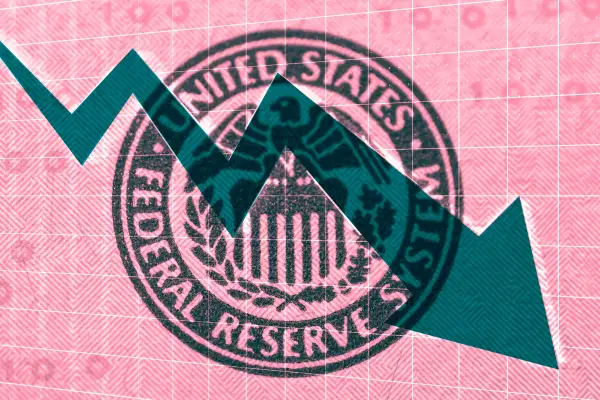Here’s What Will Happen When the Fed (Eventually) Cuts Interest Rates
Money is not a client of any investment adviser featured on this page. The information provided on this page is for educational purposes only and is not intended as investment advice. Money does not offer advisory services.

While the Federal Reserve kept interest rates unchanged Wednesday, there’s a tone shift happening and a chance that the first rate cut in four years could be announced in March.
Officials on the rate-setting Federal Open Market Committee (FOMC) removed a piece of language from their meeting statement about the possibility of higher rates, which is a significant step as the Fed shifts its posture on future rate actions.
Still, the committee says it does not expect to cut rates "until it has gained greater confidence that inflation is moving sustainably toward 2 percent."
The first rate cut will be a huge deal. Just about every corner of the economy was affected as the Fed raised benchmark interest rates from around zero in early 2022 to 5.25% to 5.50%, the level it's been since July 2023. Inflation came down — which was the main reason the Fed raised rates to begin with — while borrowing costs soared, the housing market slowed, and bond yields increased.
If and when rates are finally cut, many of the trends of the past two years will start to reverse. To an extent, that’s already happening — just in anticipation of rate cuts.
Mortgage rates will fall
While the Fed’s rates aren’t the only thing that affects mortgage rates, they’re probably more influential than anything else. Interest rate cuts from the Fed typically put downward pressure on mortgage rates.
By the end of the year, mortgage lenders could be offering average rates below 6% on 30-year fixed-rate mortgages, according to Fannie Mae. That would be almost 2 percentage points lower than the highs reached in 2023.
Lower mortgage rates could help home sales rally in 2024 if buyers come off the sidelines and are drawn back into the market by more affordable financing.
Likewise, homeowners with pre-2022 low-rate mortgages wouldn’t feel so “locked in” to their loans and may decide it’s finally the right time to list their home, alleviating the market's problems with a shortage of inventory.
Savings rates won’t be as high
In a high interest rate environment, banks and other financial institutions improve their rates on products like high-yield savings accounts and certificates of deposit (CDs). These rates would come down along with rate cuts from the Fed.
Some online banks have already lowered 12-month CD rates on the expectation that rates fall in the next year.
High-yield savings account rates can be adjusted at any time, and banks are still advertising some of their highest rates in over a decade. But savers should expect these rates to also be lowered in tandem with any Fed rate cuts in 2024.
That means savers will likely lose some of the opportunities they’ve had to earn an easy 4% or 5% APY without taking on some risk.
Rates for auto loans, personal loans and more will decrease
Auto loan rates for new car purchases were above 7% in the fourth quarter of 2023 and even higher, 11.6%, for used vehicle purchases, according to Edmunds. Personal loan rates have soared due to the Fed’s hikes, and student loan rates have also increased, especially for private loans. Credit card APRs are always high, but banks raised these, too, as the Fed hiked.
Conversely, if rates are cut in the coming months, it’s likely that you’ll see a shift: Rates should drop for all of these products, giving consumers access to more affordable financing. Falling rates would also give consumers opportunities to refinance mortgages and other existing loans and save money on their monthly payments.
Inflation could creep back up
An important inflation gauge watched by the Fed that tracks core prices shows a rate of 2.9% over the past 12 months. That’s a great improvement from the peak of 5.6% in early 2022, and on a six-month basis, core inflation is actually slightly below the Fed’s target inflation rate of 2%.
This decrease in the inflation rate opens the door for the Fed to cut rates, but there’s always a risk of cutting too soon. If rate cuts open the floodgates for spending, prices could rise faster than the Fed wants.
For example, Americans who’ve been waiting for an opportunity to find good financing for a major purchase like a car could be motivated to start shopping, leading to more demand and potentially higher prices.
The Fed's No. 1 concern is a possible rebound in inflation, especially considering that prices have already risen so much since 2021.
Due to these risks, the FOMC may decide to hold off on rate cuts in the early part of 2024, continuing to monitor the situation to be sure inflation is in check.
Rate cuts should help the stock market
Given priced-in expectations of rate cuts and stocks’ strong performance lately, it’s hard to predict how investors would react to an interest rate cut from the Fed in March.
Longer term, however, if the Fed cuts rates more quickly than the market is expecting, there will likely be upward pressure on stock prices.
Interest rates affect the stock market in many ways, but, in general, companies are better off when they can borrow money cheaply and when consumers can spend more freely. For similar reasons, when interest rates are low, you also tend to see more GDP growth and more hiring.
More from Money:
Home Insurance Costs for Beach Houses Could Soon Double in This State

